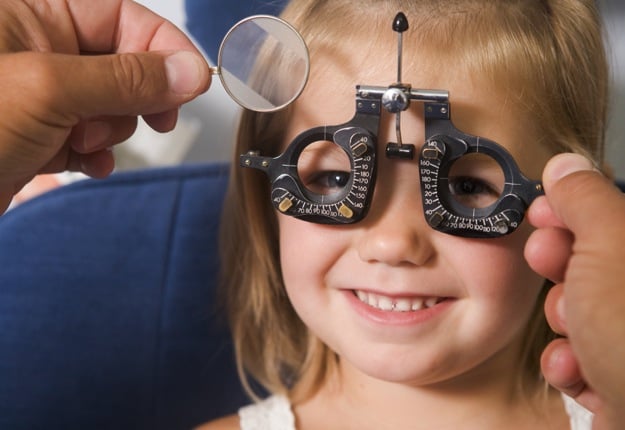Our eye health is so important, however keeping across it and booking regular appointments with the optometrist often falls by the wayside – especially in the hubbub of school schedules and busy working days.
A trip to the optometrist doesn’t just check your kids’ eyes and vision ability, it can also uncover developmental abnormalities in the eyes which can be treated. And remember to invest in yourself too! Aside from investigating your vision, a thorough eye examination can help detect more than 270 different medical conditions in an adult, including: diabetes, heart disease, and stroke risk, as well as cataracts, glaucoma, or retinal disorders such as macular degeneration.
Unfortunately, we are in a situation where parents need to start paying better attention to their kids’ eyes.
Short-Sighted
Alarmingly, 50 per cent of the world’s population is expected to have myopia (the clinical name for short-sightedness) by 2050, and cases of this are tending to hit our younger people in Australia more severely than in the past.
Myopia has a strong genetic link, and recent research indicates there are other drivers too. Evidence shows that excess screen time increases the risk of myopia developing in children and teenagers. More time spent indoors increases the risk of short-sightedness, especially when you spend hours reading or on the screen, putting a lot of pressure on the eyes. A big watch out for parents!
Kids May Not Realise They Have Bad Eyesight
Interestingly, a child may not realise they have impaired vision. They may not notice the slow changes and think this is normal as they don’t have a baseline to compare it to. This is why it is so vital that your child has regular eye examinations as they grow.
Here are my top tips for keeping your kids’ eyes healthy:
- Head to the optometrist at an early age. As a rule of thumb, kids should visit the optometrist from the age of four, just before they start school. This will allow us to quickly address any issues and ensure your child is set up for success in the classroom. Did you know that 80% of what a primary school child learns is visual?
- Keep visiting! Your kids’ eyes will change and develop year-on-year. Make sure you’re putting eye health on the agenda each January ahead of school.
- Limit screen time by enforcing breaks. Dry eyes can impact children too and the increase in online learning and screen play can also result in digital eye strain. I recommend the 20, 20, 20 method where possible – for every 20 minutes spent looking at a screen, you should look at something 20 feet away for 20 seconds. This is because it takes 20 seconds for your eye muscles to completely relax.
- Make sure your kids spend time outside every day, taking part in activities such as field sports or walking the dog. Being outside in wide open spaces with sunlight allows eyes to focus on objects beyond screen distance. This results in better depth perception and shape recognition.
- If your kids are sporty or active teenagers, look at options outside of glasses. ACUVUE offers a range of contact lenses to address digital eye strain, astigmatism and dry eyes. I regularly fit lenses to children 8 years of age and upward and they enjoy the experience of seeing the world without glasses.
Narelle Hine runs her own practice HineSight Optometrist in the City of Sydney. She has extensive experience in clinical eye care and disease screening, contact lens prescribing and relieving the chronic visual fatigue of screen users. She regularly presents continuing education topics at Optometry conferences around Australia and retains a strong interest in contact lens research.





















12:19 pm
4:45 pm
12:33 am
2:56 pm
10:21 am
9:02 am
6:55 am
11:16 pm
8:51 pm
3:26 pm
9:28 am
8:21 am
4:40 pm
12:38 pm
11:51 am
7:43 am
7:17 am
9:02 pm
10:23 pm
9:49 pm
- 1
- 2
- »
Post a commentTo post a review/comment please join us or login so we can allocate your points.